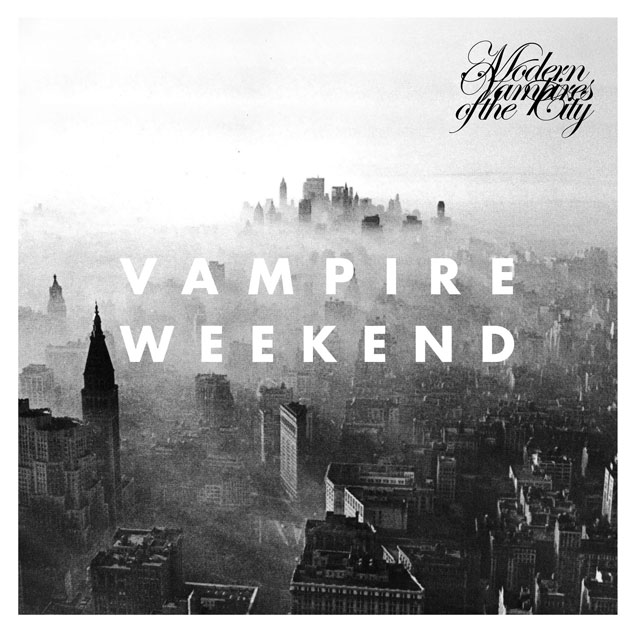Editor’s note: Another great post from Benjamin Griffin, lover of all things musically creative and Master of Spirituality. (Really, that’s his degree.) Here, he reflects on the blurring of lines between “religious” and “secular” music in the latest release from Vampire Weekend, “Modern Vampires of the City.”
By Benjamin Griffin
I grew up adoring alternative Christian music. While I began with traditional CCM, I quickly found that there were artists in all genres, from ska to metal, singing praise, filling in the gaps where ‘secular’ music left me unfulfilled. Now, don’t get me wrong, I still adored and listened to any and all ‘secular’ music I could get my hands on but, being a young and thirsty Christian, I had a natural inclination to listen out for any possible mention of God. Deep down though, I just wanted all sides of the argument and was fascinated when secular artists would address and wrestle with issues of faith.
It took me a long time, however, to truly know what to do with the argument. After all, being fairly conservative in my youth, it would upset me greatly when I heard the struggles of anger or hurt brought on by religion (looking at you, Everclear’s ‘Why I don’t Believe in God.’). Not that I didn’t respect it, I just didn’t quite know how to incorporate it, how to face it, how to use it to enter into the conversation. Now that I’ve grown out of my comfortable conservative shell, spent many more years studying religion and theology, I can safely (and finally) say one thing for certain: these aren’t ‘secular’ voices, these are, in fact, religious voices.
Now, the artists themselves might take issue with this statement, but let me clarify. The impetus for this article began when I got the new Vampire Weekend album, Modern Vampires in the City. As a fan, I was fully prepared to listen to another great album of Ivy-League life observations set to kinetic Afro-indie pop but what I got instead was an album that spends nearly half of its time wondering what the deal is with God – specifically, the Jewish conception of God. From the joyfully irreverent “Unbelievers” (We know the fire awaits unbelievers/ All of the sinners, the same./ Girl you and I will die unbelievers/ bound to the tracks of the train) to the hopeful humility of “Everlasting Arms” (Hold me in your everlasting arms/Looked up full of fear/Trapped beneath a chandelier that’s going down.) the album’s religious notes are often shockingly poignant.
The key track, however, is the Yahweh- skewering “Yah Hey.” Now, before anyone wants to get offended by the silly title, let me offer that this is one of the most remarkable songs about spiritual wrestling I’ve ever heard. On the surface of it, it can seem a bit flippant with its repetitive voice altered chorus but, if you listen closely, this pop song presents an incredibly important, if fairly common, problem with our relationship with God. Singer Ezra Koenig deftly challenges the notion of God’s unchanging nature as “I am who I am” in light of the changing whims of His various people (with the straight to the heart line “Zion don’t love You, Babylon don’t love You”). Now, as someone who wrote a thesis with a central focus on the conception of God’s Self-Subsisting identity inherent in His proclamation to Moses, I must say that this song is simply brilliant in it’s blunt frustration with the nature of God in relation to His created images. Vampire Weekend is posing a very necessary question when they ask of God:
“Through the fire and through the flames
You won’t even say your name
Through the fire and through the flames
You won’t even say your name
Only “I am what I am”
But who could ever live that way?
Ut Deo, Ya Hey
Ut Deo, Deo”
While I could write an entire essay exploring the themes of this song, I merely mention it in order to get to a more important issue – namely, that although Koenig is at best ambivalent about his religious affiliations in interviews, his voice is just as essential to religious or spiritual music as any artists on Christian labels BEC or Tooth & Nail. I can imagine some fans have been quite confused by this album’s religious preoccupation and, on the flip side, that fans of ‘religious music’ might be offended by its occasional flippancy.
What both sides need to understand, however, is that Koenig’s voice is an essential element in what makes modern religious music relevant. But this isn’t about Vampire Weekend’s popularity – what I’m talking about is the potential for a wider conversation.
If our only option for ‘authentic’ religious music consists of the sort of acoustic light-rock love songs that echo softly against church rafters like a big fluffy pillow, then our religious experience will simply become a stagnant hovel where we hide from any actual engagement with how the world understands and encounters God. There is certainly a time and place for wooing God as our Beloved, but we have to admit that there are some kinks still left in this relationship.
While “Yah Hey” might come as a slap in the face for some, “Everlasting Arms” helps remind us that regardless of whatever issues we have with our religious histories, we are all equally a part of the human struggle towards a fulfilling spiritual life. Vampire Weekend will never be labeled a ‘religious’ band, but why should they be? They’re a human one and that’s enough to hear them out because it turns out, they have fascinating things to say.
Benjamin Griffin graduated with a Master of Arts in Spirituality from the Dominican School of Philosophy and Theology in Berkeley, CA in 2013.



